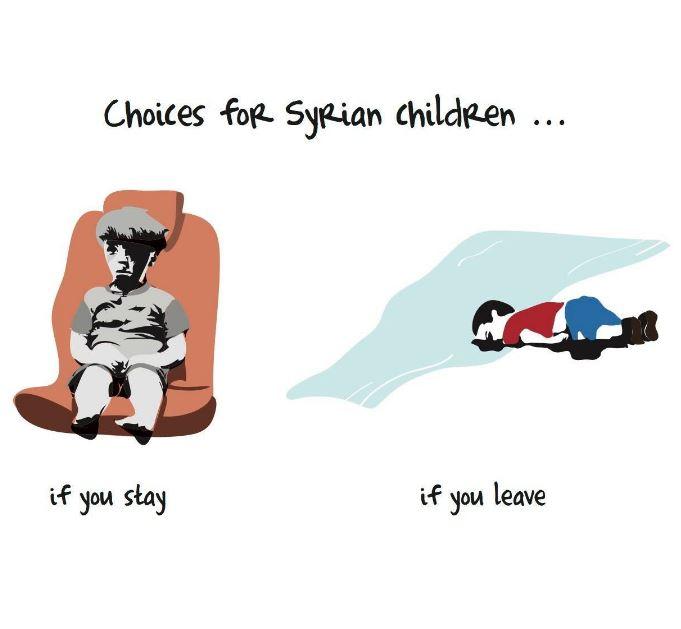What happened when my cartoon of Omran Daqneesh the Syrian child went viral
Andy Warhol might have imagined a world where everyone got their 15 minutes of fame, but in the age of Snapchat it’s more relevant to say everyone gets their 10 seconds

Andy Warhol famously said, “In the future, everyone will be world-famous for 15 minutes.”
After watching the video of Omran Daqneesh, the Syrian child who was saved from the ruins of his collapsed building after airstrikes on Aleppo and pictured, dazed and bloodied, in the back of an ambulance, I did the only thing I can do: a cartoon.
This cartoon – or “Khartoon” – was liked, shared, reposted, and retweeted by world renowned politicians and celebrities. The cartoon went viral and ended up translated and published in most major publications from The New York Times to blogs in Japan (some with my permission, most without, and all without pay).
Within a few hours after posing it on my Facebook page, I was interviewed by CNN, AJE, TNT, the BBC, the Huffington Post, Buzzfeed, Hindu Times, Masrawy and many more. Everywhere but my native Sudan, but that’s another issue.
As a social media-based artist, this has not been the first time I have seen one of my cartoons go viral. It all started in the first days of the Arab Spring when my work suddenly got the attention of the internet and the international media. Nevertheless, every time my work goes viral I still get puzzled and anxious and ask myself: why this image? What do I do now? And most importantly, what do I do next?
Going viral is as surprising as when you “perform” the usual way you always do, but your partner tells you it was the best experience of their life. Of course, you wonder silently what you did different this time and if you will be able to know how to repeat that moment in the future, on purpose.
Andy Warhol might have imagined a world where everyone got their 15 minutes of fame, but in the age of Snapchat it’s more relevant to say everyone gets their 10 seconds. I have quickly learned that the internet has a very short memory, especially when it comes to news. Tomorrow, inevitably, there will be another must-see video or image, or an Isis attack elsewhere that Twitter will deem worthy of its attention.
I don't worry about my post-viral action now because I realised, after my initial experience, that I will be a “has-been” almost immediately. But that’s not necessarily a bad thing. In a world of memes, gifs and instant rolling news, the internet doesn’t tolerate the usual or the expected. That means that to stand out I have to work smarter, not harder, and to try to ask different questions.
I wanted to write this article to explain how it feels to be the internet’s chosen one for the day, and gave it a lot of thought since I’m a slow writer (I’m dyslexic). Some have tried and failed to prolong their 15 minutes – or 10 seconds – of fame, so I realised how quick off the mark I’d have to be to publish it before the media forgot Omran Daqneesh and the many other Syrian children like him.
The coverage of Syria should go more viral than any image – it lasts longer than any flash in the pan. In that case, we can’t afford to let the internet decide what’s really important.
Join our commenting forum
Join thought-provoking conversations, follow other Independent readers and see their replies
Comments